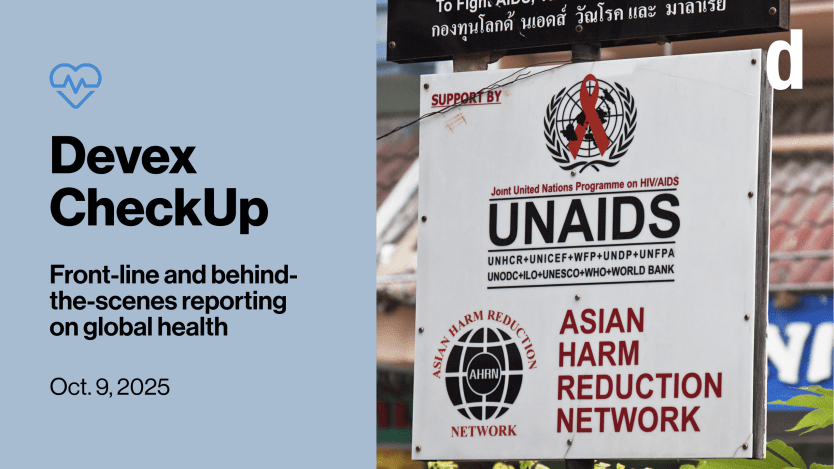Devex CheckUp: Who decides UNAIDS’ future — the board or the boss?
Presented by The Global Energy Alliance for People and Planet

Is the U.N. talking to itself?
That’s the first thing I asked myself when United Nations Secretary-General António Guterres released a report last month proposing, among other things, to sunset UNAIDS by 2026.
The proposal came months after the UNAIDS board endorsed a gradual transition plan for the joint program. That plan’s first part involved a new operating model where the secretariat would have to operate with significantly fewer staff and downsize its country presence. After that, it is expected to present another plan in 2027 to further transition the joint program — and possibly sunset in 2030.
UNAIDS says the decision was submitted to the U.N. secretary-general and the team behind UN80, the reform effort to make the U.N. more efficient. So it came as a surprise, even to members of the UNAIDS board, when the secretary-general proposed something totally different.
At a special session of the board on Wednesday, the board decided to reaffirm its decision made in June to endorse UNAIDS’ phased transition, with several member states from Africa expressing concern that the U.N. secretary-general’s proposal risks undermining the decisions made by bodies that have oversight on UNAIDS. They added that any attempt to accelerate UNAIDS’ transition could further disrupt “an already fragile [HIV] response.”
Over 1,000 NGOs are also opposing the proposal and are asking to meet with Guterres to ensure their perspectives are taken into account. They argue that immediately sunsetting UNAIDS is “profoundly dangerous” amid significant funding cuts in the global HIV response and increasing pushback on the rights of communities most affected by HIV and AIDS. These are areas where UNAIDS provides critical leadership and advocacy.
But there remains uncertainty on the way forward as some member states want to ensure alignment with the U.N.’s wider reform effort.
“There is a slight uncertainty in the room about how the decision will end up landing. So we also do need to do the scenario planning piece and anticipate if we were forced to close somehow next year, how would we manage that transition to make sure that we don’t just leave a gaping hole behind,” Fionnuala Murphy, head of global advocacy at Frontline AIDS and part of the NGO delegation on the UNAIDS board, tells Devex.
But she’s clear that the secretary-general’s plan doesn’t really give them much time. “If it’s next year, we really don’t have time to prepare adequately,” she says.
Read: UNAIDS faces uncertain future amid UN reform push
Levy for your thoughts?
ICYMI, we launched a new series on The Future of Global Health, which digs into the ripple effects of foreign aid cuts and the search for a new path forward. And this week, we’re looking at the issue of domestic financing.
With foreign aid for health in decline, health experts are spotlighting the use of health taxes as an opportunity to fill the enormous health funding needs in countries. One report estimates that raising the price of tobacco, alcohol, and sugary beverages by 50% would raise $3.7 trillion in revenue over five years, with the added benefit that it would reduce people’s consumption and prevent more cases of noncommunicable diseases, or NCDs.
But my colleague Andrew Green reports that these levies may not be a financial panacea. Very few countries have raised their taxes to the level the World Health Organization recommends due to industry lobbying. Some countries also lack the proper infrastructure in place to ensure the effective collection of revenues and prevent the money from falling into corruption. Additionally, there’s the danger that populations will turn to other means of securing these products — such as home brewing alcohol and purchasing smuggled tobacco — which in turn cuts potential government revenue.
Read: Can countries tax their way out of a global health funding crisis?
+Listen: For the latest episode of our weekly podcast series, Andrew joined my colleagues Rumbi Chakamba and Sara Jerving to discuss health taxes and other key global health takeaways from UNGA80.
‘Taking Responsibility’
The leaves have turned colors in Berlin, which must mean it’s time for the World Health Summit. The annual fall event, which has grown in stature over the years, brings together government, industry, and multilateral leaders to discuss critical global health issues.
There is no strong Washington presence in Berlin this year, in part because the ongoing government shutdown in the United States has blocked officials from attending. But — as it does on virtually every issue — the Trump administration will still shadow the proceedings.
Key topics to be discussed include the future of global health financing. The WHS is one of the first opportunities for European leaders to respond to the recent America First Global Health Strategy. With the theme of “Taking Responsibility,” there’s reason to expect the WHS will maintain the U.S. focus on shifting away from aid-dependent models.
And NCDs are also high on the agenda. The response to NCDs has suddenly become a fraught issue after U.S. Health and Human Services Secretary Robert F. Kennedy Jr. disrupted the adoption of an already watered-down NCD declaration at the U.N. General Assembly.
Devex will be on the ground at WHS as a media partner, and we’ll have a special newsletter out next week with all of the highlights. We’re also hosting an official side event at 4 p.m. on Oct. 12: Who pays for health? Industry’s role in a post-aid era. If you are registered to attend WHS, you can RSVP here to attend our event.
ICYMI: US objections stall UN effort to tackle noncommunicable diseases
In need of reform
Global health reform will also be front and center at WHS. And for WHS President Axel Pries, reform cannot just be “small cosmetic changes.”
“We need a structural reform to make our multilateral system more efficient, robust, and fair,” he writes in an opinion piece for Devex. That includes strengthening the role of the global south, replacing donor-recipient models, and simplifying structures to “increase effectiveness, transparency, and flexibility.”
All countries and major multinational corporations should contribute to health, instead of the sector relying on any single donor. Health should also be seen as an investment, not merely a charitable cause, he adds.
Opinion: The global health landscape will never be the same — and it shouldn’t be
ICYMI: What’s broken in global health, and how do we fix it?
Unfinished jab
The world is so close to eradicating polio, with just a few hundred cases in 2025 compared to hundreds of thousands of cases over four decades ago. But a mixture of funding cuts, limited infrastructure, misinformation, and the difficulty of reaching remote communities poses challenges to reaching that milestone.
That’s what Sara witnessed in Madagascar, a country that WHO declared free of the wild poliovirus in 2018, but experienced outbreaks of a type 1 polio variant between 2020 and 2023. While it was able to stem the outbreak this year — thanks to the combined efforts of the government, international organizations, and community health volunteers — the potential of another outbreak lurks in the background as the country struggles to vaccinate all children, address water shortages, and end open defecation, which creates an optimal environment for polio to spread.
U.S. funding cuts are adding to the challenges. Since the closure of the USAID-funded ACCESS program — which provided financial incentives for community health volunteers to help promote vaccination and improve data collection and quality — one health facility chief observed a drop in patients coming to her clinic and volunteers coming to monthly meetings to cross-check data.
Some experts are hoping the reduction in foreign aid will make the Malagasy government less dependent on donors, but Sara reports they’re also concerned it doesn’t have the resources to cover the shortfalls.
Explore the visual story: Against the odds — Madagascar’s fragile polio victory
Your next job?
Strategy Officer, Maternal, Newborn, Child Nutrition & Health
Gates Foundation
United States
See more jobs.
Where mission meets margin
For years, organizations offering sexual and reproductive health services have seen their funding fluctuate with changes in U.S. leadership. That prompted MSI Reproductive Choices — one of the largest providers of such services globally — to reduce its dependence on U.S. aid and look for alternative funding sources.
It’s now exploring impact investing. Sam Tiwari, head of philanthropy at MSI, believes this approach could grow its social business model, which includes a network of over 300 clinics and 20 maternity hospitals across Africa and Asia offering women's health services and selling contraceptive products.
The model has become an important source of income for MSI, and now accounts for nearly 50% of its total funding. With capital from impact investments, the organization believes it can further expand its services, meeting the needs of women requiring cervical cancer screening and those entering perimenopause and menopause.
Read: Why MSI is exploring impact investing for reproductive health financing (Pro)
+ Curious about the insights that drive global development? Experience Devex Pro with a 15-day free trial. Explore expert analyses, unlock hidden funding opportunities, connect with key players at exclusive events, and more. Discover all the exclusive content available to you here.
One big number
15 million
—That’s how many premature deaths can be prevented every year if the world shifts to a more plant-based diet and refrains from unsustainable food production, according to the latest report by the EAT-Lancet Commission.
It explains that current food systems generate about 30% of global greenhouse gas emissions. If left unchanged, this could push the planet beyond 1.5 degrees Celsius — the limit on global warming that countries agreed to in the 2015 Paris Agreement — even if fossil fuels are phased out.
But in the current political climate, achieving this kind of sweeping transformation is a tall order as the scale of change required is at odds with entrenched interests, politically polarized debates, and the short-term focus of many governments, Devex Senior Editor Tania Karas reports.
Read: Planet at risk — new EAT-Lancet report warns food system overhaul is vital
+ For more content like this, sign up to Devex Dish, a free weekly newsletter on the transformation of the global food system.
What we’re reading
The U.S. charges two with theft from a USAID Kenya procurement program. [Devex]
The Nobel Peace Prize for Medicine was awarded to three scientists who discovered T cells that prevent the immune system from attacking the body. [Associated Press]
More than 100 million people, including 15 million children, are using electronic cigarettes, fueling new nicotine addictions, WHO warns. [BBC]
Search for articles
Most Read
- 1
- 2
- 3
- 4
- 5








